Free Speech, The Force of Law and Other Issues

Interview by Richard Marshall
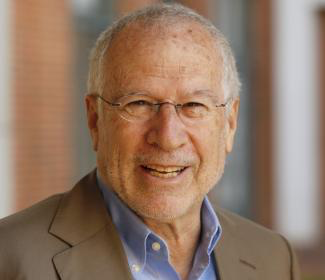
'Debates will remain shallow as long as proponents of restriction insist that everything that is harmful ought to be restricted while opponents insist with equal vigor that the speech is harmless. Only by accepting that some of such speech is genuinely harmful can we have a fruitful discussion of when (if ever) and why harmful speech ought to be restricted, and when (if ever) and why harmful speech ought to be protected or tolerated.'
'That form of jurisprudence that focuses on identifying, understanding, and theorizing the essential properties of the concept of law in all possible legal system in all possible worlds has often produced useful insights and valuable clarification, but I think it important to grapple with the possibility that there may not be any such essential properties of law.'
'Maybe there are instances in which those whose rights are rightfully restricted are nevertheless entitled to some form of compensation or other redress.'
'I think that legal positivism can be a descriptive position, but that it can also be a normative one.'
'Finns stand obediently at crosswalks when the sign says “Don’t Walk” (in Finnish) even when there are no cars or police officers in sight, but that seems hardly a widespread behavior throughout the world.'
'To take a current pressing matter, science can tell us about the effectiveness rate of a Covid-19 vaccine, but whether that rate is sufficient for use is a question whose answer must not go against the science, but can be determined only by the application of moral, political, and economic criteria that go beyond the science.'
'Much of the best philosophical research on vagueness – Diana Raffman and Roy Sorensen come to mind – is highly relevant to law.'

Fred Schauer is a professor of law with an interest in some of the philosophical aspects of law. Here he discusses how lawyers think, Mill's On Liberty, free speech, how best to understand the nature of law, racist violence and free speech, the force of law and coercion, legal positivism, the importance of the distinction between compliance and obedience, the importance of rules of law, privacy, freedom of information, profiles, probabilities and stereotypes, why the admissibility of fMRI use in courts is not just a scientific question, vagueness in law, and why philosophical insights should be used more when considering how law operates.
3:16: What made you become a philosopher?
Fred Schauer: I want to question your premise. Although some of my work is informed by some domains of contemporary analytic philosophy, although I write books with a philosophical cast and sometimes publish in philosophy journals, and although I like to think that my approach to problems exhibits something of a philosophical mindset, I have never had a philosophy course in my life. Whether this makes me a non-philosopher or instead a self-taught philosopher is not for me to say, but I am constantly reminded (by myself, and occasionally by others) that there are significant domains of academic philosophy of which I am woefully ignorant, much more so than someone who majored in philosophy as an undergraduate, and certainly more so than someone who did graduate study in philosophy.
That said, my journey into philosophical domains started after I became a legal academic, initially focusing on the legal issues of freedom of speech. As I worked more and more on the legal issues, I was struck at the time (late 1970s) with the lack of very much serious theory about freedom of speech, and resolved to write a book about the theory of free speech. Working on the book, and with the benefit of hanging out a bit while on sabbatical with some of the philosophers at Cambridge University (Mary Hesse and Bernard Williams, most helpfully), I started to read what had been written about free speech as a philosophical issue, and that sparked an interest in philosophical approaches more generally.
The product of all of that was a book (Free Speech: A Philosophical Enquiry, Cambridge 1982), but even more an awareness of how philosophical thinking and the philosophical literature could inform various other legal problems that interested me. So I have used a fair amount of philosophy of language in thinking about legal and constitutional interpretation, some philosophy of science and epistemology in addressing issues of legal evidence and proof, and some of the literature in conceptual ethics and metaethics in trying to say something about the structure of legal and moral rights, about rules and precedent and authority and the other somewhat distinctive features of legal reasoning, and about the nature of law in general.
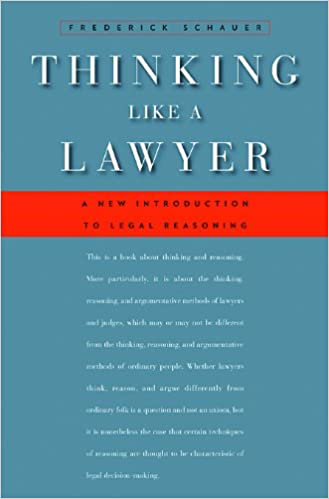
3:16: One thing you’ve argued is that law thinks differently from just people. So what makes law thinking distinctive and does that make legal decisions and judging different from ordinary decision making and judging too, and also change the relationship between legal and ordinary language?
FS: Yes, legal decision-making is different from ordinary decision-making, but only in a soft sense. That is, many of the characteristic devices of legal decision-making – interpreting and applying rules; being constrained by precedent; taking authority seriously because of its source and not its content; etc. – appear in many aspects of non-legal life. Any parent of multiple children (not me), for example, is familiar with arguments from precedent. But certain forms of decision-making are more dominant in law than in other decision-making domains, and that is because, in part, legal decision-making is more attuned, for better or worse, to institutional consistency, and thus to a non-particularistic approach to decision-making.
People often use the phrase, “all things considered,” but legal decision-making is often based on the idea that sometimes it is not good to consider all things. Accordingly, things like rules and precedent are often especially important in law, even when they seem to produce the wrong outcome on particular occasions. So too with authority. In law more than in many other domains, what matters is who said something (a judge, a legislature, the constitution, etc.), even if what was said is, authority aside, possibly sub-optimal or even wrong.
3:16: You’ve an interesting rereading of Mill’s On Liberty (in particular the relationship between chapter 1 and chapter 2) that understands freedom of speech and harm differently from received wisdom on these issues, and you distance yourself from the particularly American attitude to freedom of speech. Could you first sketch for us the usual way Mill is read and understood?
FS: The most common reading of On Liberty takes Chapter 2 as an instantiation of Chapter 1. That is, in Chapter 1, Mill, famously, argues that it is illegitimate for the state to restrict personal conduct except to prevent harm to others. Preventing harmless immoralities, or preventing harmful conduct harming only the actor, are, Mill argues, beyond the state’s proper powers. And so when in Chapter 2 Mill argues for the “liberty of thought and discussion,” it seems straightforward to take thinking and discussing as coming within the Chapter 1 argument and thus as harmless. And this reading is reinforced by the childhood adage “Sticks and stones may break my bones, but names will never hurt me,” by the common civil libertarian acceptance of the harmlessness of speech, and by the frequency with which arguments from harmlessness are conjoined with distinct arguments from free speech, as is especially common (and often justified) in the case of arguments against restricting certain forms of sexually explicit speech whose only regulable attribute is its challenge to a certain form of moral sensibility about sexuality.
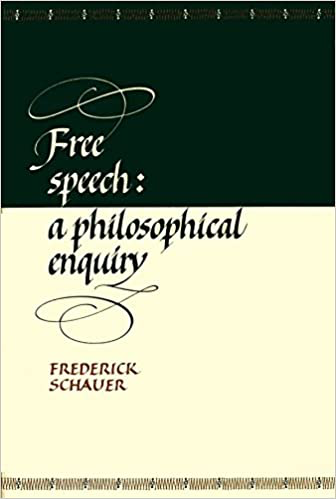
3:16: So how do you read Mill and can you perhaps give an example of the difference your approach makes to understanding an issue such as pornography or the recent eruption of free speech and harm claims on university campuses?
FS: In contrast to the conventional reading I have just described, I think a better reading (whether it was Mill’s intended reading I will leave to others to decide) is that Chapter 2 is an argument not for protecting thought and discussion because they are harmless, but despite the harm they may cause. Thus, when Mill argues for the epistemic advantages of a regime of liberty of thought and discussion, I read him -- or reread him – as saying that protecting even harmful thought and discussion is necessary to secure the epistemic advantages of a free speech regime, or to secure the advantages of intellectual character that come from requiring people to confront what they think false, and thus to understand why what they think false is actually false. And thus the conventional reading, which takes freedom of speech to be protected because of speech’s harmlessness, cannot explain (or justify) the protection of harmful speech, and thus offers a defense only of a weak and very limited free speech principle. My preferred reading explains and justifies a more robust free speech principle, although the question then remains whether such a robust principle is a good thing.
I think the current debates about free speech are a good thing, because for far too long there has been much less debate about free speech than a free speech regime urges us to have about everything else. With respect to pornography, many of these debates have been frustrating because of confusions about labels. Traditionally, those who would restrict sexually explicit depictions have objected to the sexual explicitness, and have defined “pornography,” and the legal term “obscenity,” in terms of sexual explicitness. But although most sexually explicit literature until recently was distressingly celebratory of sexual violence and sexual coercion, there is nothing about sexual explicitness itself that needs to include such themes. Conversely, there is nothing about the verbal or pictorial endorsement of sexual violence, coercion, and exploitation that requires explicitness. So if we take Mill as arguing only for the protection of harmless speech, he turns out to have little to say about the regulation of speech that encourages or endorses or tolerates sexual violence, at least if we accept – and this is an empirical social science question and not a purely conceptual one – that widespread endorsements of sexual violence have a probabilistically causal relationship to the societal level of sexual violence. But if we take Chapter 2 as arguing for the desirability of protecting false views – the view that women who say “no” mean “yes,” to take one of the most notorious examples – then Mill provides support for the existing American legal and constitutional view, although, again, it is hardly clear that that that view should be accepted.
Much the same applies to many of the parallel debates on university campuses, many of which are focused on various forms of so-called hate speech, including race-based insults, vilification, and denigration. Again, there are important debates to be had about whether such speech ought to be protected in general, or ought to be especially protected (or especially unprotected) in university environments. But such debates will remain shallow as long as proponents of restriction insist that everything that is harmful ought to be restricted while opponents insist with equal vigor that the speech is harmless. Only by accepting that some of such speech is genuinely harmful can we have a fruitful discussion of when (if ever) and why harmful speech ought to be restricted, and when (if ever) and why harmful speech ought to be protected or tolerated.
3:16: Do you think identifying, understanding and theorising the essential properties of the law a desirable goal for jurisprudence or do you rather think there are better ways of getting to grips with the nature of law? Your approach seems much more about locking onto anthropological and sociological evidence as much as pure armchair conceptual enquiry. How should we go about getting a theory of law – and what are the main components of your theory of law if you have one?
FS: That form of jurisprudence that focuses on identifying, understanding, and theorizing the essential properties of the concept of law in all possible legal system in all possible worlds has often produced useful insights and valuable clarification, but I think it important to grapple with the possibility that there may not be any such essential properties of law. Maybe law is a cluster concept. Or maybe the essential properties, if there are essential properties, turn out to be so banal that we have not learned very much about law. More importantly, I want to resist the idea that identifying, understanding, and theorizing the essential properties of law, even if there are such essential properties and even if identifying them leads to valuable insights, is the only legitimate form of jurisprudence (or philosophy of law). Philosophical analysis of the devices of legal reasoning and legal argument is not a search for law’s essential properties, but nevertheless uses philosophical approaches to reveal valuable things about law. And although I will leave to those in Canberra and elsewhere to argue about the possibility and/or value of what you describe as “pure armchair conceptual inquiry,” I am sympathetic to the idea that philosophical or theoretical inquiry informed by empirical research and conclusions has an important place in the domain of jurisprudence/philosophy of law. I prefer “empirical” to your “anthropological and sociological” partly because I do not want to narrow the scope of empirical inquiry, partly because I am ill-equipped to determine what counts as anthropological or sociological, and partly because I do not want to buy into some of the contemporary epistemological and normative commitments of those disciplines as currently constituted. But I willingly embrace empirical inquiry in many versions as properly within the domain of jurisprudence, and, when coupled with philosophical analysis, as properly within the domain of the philosophy of law.
I don’t have a theory of law. My recent work has tried to take more seriously than post-Hartian jurisprudence has taken the coercive and sanction-based aspect of law, and I remain interested in law as a limited domain in which arguments and sources accepted in the larger society are ineligible in law, and vice versa. But I will leave to others the development of a “theory of law,” assuming there can be one, which is not clear to me.
3:16: Linked with this, you’ve engaged forcefully with the events of Charlottesville, Virginia, and the racist violence there. How should we understand the pressing issues regarding free speech that are raised by that event – for example, given we compensate those who lose property rights for the common good, should we compensate those who lose their free speech rights?
FS: I have long been interested in the structure of rights as a subject somewhat distinct from the content and sources of rights. And if we understand, as we should, rights as overridable, then we should think about what we owe to those whose rights are rightfully restricted. Judith Thomson and Frances Kamm, among others, have identified the issue, but there is more to be done and said. In particular, and Thomson is a noteworthy exception, much of the literature focuses on the remorse or regret of the agent who rightfully restricts the rights of others. But this perspective pays too much attention to the restricter and too little to the victim. Maybe there are instances in which those whose rights are rightfully restricted are nevertheless entitled to some form of compensation or other redress. It is what most developed democracies do when they take property for the public good. Maybe the same should apply when rights are restricted for the public good.
3:16:You take law to be coercive, which seems obvious but you think it’s a point that has been downplayed by legal philosophers trying to pinpoint what law is, how it operates and the role it has in organizing society . So why do you think jurisprudence has tended to marginalize this feature? Did this begin when HLA Hart demolished John Austin’s sanctions-based theory of law or has it a longer history?
FS: I am not sure I would use the word “demolished.” If we start with the idea that there are essential properties of the concept of law, which I qualifiedly resist, then Hart may be right that sanctions and coercion are not essential. So the widespread acceptance of Hart’s argument against Bentham and Austin may be a function of the tendency of many of Hart’s followers (but maybe not of Hart) to suppose that if sanctions are not essential to law then they are not important to jurisprudence. So there is a close connection among questions about coercion and sanctions, questions about the nature of the concept of law, and questions about the nature of jurisprudence. And thus my attention to sanctions as a ubiquitous feature of law as we know it is an attempt to fill a gap produced by a too-narrow view of just what it is to do jurisprudence in the first place. But I do think that much of the tendency to downplay coercion and sanction is relatively recent. Not only don’t we see it in Bentham and Austin, but we also don’t see it in Kelsen, among others. We don’t even see it in the later chapters of The Concept of Law. So my quarrel, primarily in my 2015 The Force of Law, is partly with Hart, who challenged the factual premise of Austin’s focus on sanctions, but even more with Hart’s followers and interpreters.
3:16: Before looking at the issue of coercion could you say what your attitude to positivism in law is – do you think it is more normative and adjudication- focused than many contemporary positivists do and why do you think it’s important to extend the understanding of legal positivism in this way from what is usually said about it?
FS: I think that legal positivism can be a descriptive position, but that it can also be a normative one. It certainly was for Bentham, and to suppose that Bentham’s normative case for positivism and for a positivist view of adjudication is peripheral to his view about law is to impose on Bentham a particular view of jurisprudence that Bentham did not hold and would likely have dismissed. And although, as Julie Dickson says, Hart’s view on this is “awkward,” given what he wrote on different occasions, the Hart of his debate with Fuller seems to me to be willing to make the normative moral and pragmatic case for positivism, which strikes me as faithful to modern analytic legal positivism’s Benthamite origins. So I have been and remained concerned to explain and defend normative legal positivism, which is somewhat, although not dominantly, a view about what judges ought to do in some contexts in some systems at some times.
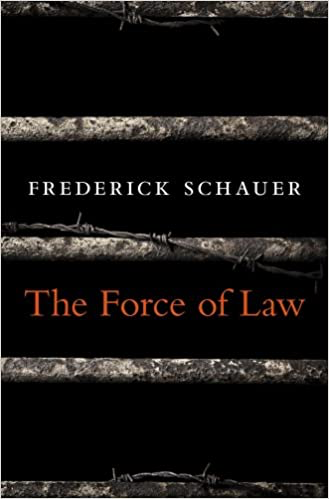
3:16: Why do you say coercion is so important for the force of law? Presumably it’s an empirical question whether people obey the law because it’s the law or not, so what is the evidence regarding this question?
FS: You put it well. Yes, in theory people could obey the law just because it is the law. But whether and when they do so is an empirical question. Tom Tyler’s research suggests that it is common, but I am not sure that he focuses as much as he should on the content-independent “because it is the law” question as framed by M.B.E. Smith, John Simmons, and others. And if we do focus in this way, the empirical support for the view that sanction-independent and content-independent obedience to law just because it is the law is pretty thin. It is not non-existent. Finns stand obediently at crosswalks when the sign says “Don’t Walk” (in Finnish) even when there are no cars or police officers in sight, but that seems hardly a widespread behavior throughout the world.
3:16: You frame the issue of law’s coercive side in terms of people’s proclivities toward obedience to law. However, compliance with the law doesn’t seem to be the same as obedience , for example, so what exactly does it mean when we say someone is following or obeying the law?
FS: Yes, compliance and obedience are different. I comply with the laws against murder and arson, for example, but my behavior is not influenced in such cases by the law. I want to emphasize “obedience” as acting in compliance with the law because it is the law, and that seems the correct way to frame the empirical inquiry.
3:16: If the source of following the law is coercion, does that solve the question about the normative force of the law, a question David Enoch has called a ‘pseudo-question’, or do we need something else to understand the legal link between norms and facts?
FS: I agree with Enoch that this is a pseudo-question, and for me that is because it collapses into the question whether there is a moral obligation to obey the law just because it is the law. That is a very real and important question, but whether law does or can have normative force beyond this is a question I, along with Enoch, find puzzling.
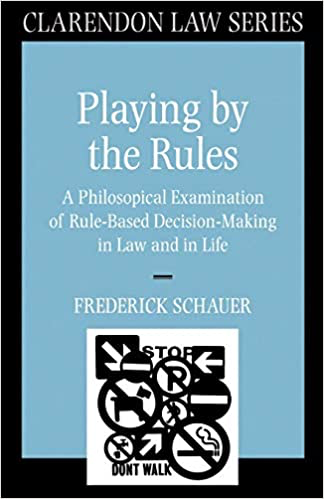
3:16: You’ve argued that rules in law are important as devices for the allocation of power among decision-makers. So what are legal rules? Are they fictions? And why do you say they should be more strictly applied than they are, and why is your position opposed by many who don’t see roles as being as significant as you do?
FS: As I argued decades ago in Playing By the Rules, rules are prescriptive generalizations. And they are not fictions. They are prescriptions that are couched in general terms, and thus purport to tell their subjects what to do (defeasibly) in some category of instances. I do not have an acontextual view of when following rules is a good thing and when it is not. But to think that rule-following is acontextually bad is a view I do want to resist. I want my police officers and customs officials to follow rules, even if they think that the rules produce suboptimal results on particular occasions. It all depends on who makes the rules, who enforces the rules, who interprets the rules, and who the rules are directed to.
3:16: Privacy is a matter that you wrote about some time ago too but is an issue that seems even more pressing now as so much data about us is now held by governments and corporations. You asked then whether public figures could have private lives – I guess the question is now becoming, can anyone have a private life?
FS: In the modern technological era, privacy is elusive. And although I think that privacy is usually a good thing, I also take seriously the challenge of Catharine MacKinnon and others who worry about the violence committed behind a cloak of privacy. And for public figures, there has been a long and not glorious history of journalists being reluctant to report on various forms of allegedly private behavior by public officials. In a democracy I would prefer that this be decided by the public rather than by elite gatekeepers.
3:16: How should we try and address the issue of privacy in this new digital ecosystem?
FS:I do not consider myself sufficiently attuned to the ins and outs of the modern digital ecosystem to be able to answer this intelligently. Maybe it is a function of age!
3:16: Freedom of Information is another growing area of importance for us all. Do you think we have a right to know and what are the limits? Has the Wikileaks incident changed how we think about this issue?
FS: Information is a good thing, but so is privacy. Transparency is a good thing, but so is confidentiality in some settings. So there are no clear answers, and although Wikileaks and the like often expose official misbehavior, there are questions to be asked, and that courts are now asking, about the legitimate methods of investigation. If it is good that investigative reporters can hack into official sites and the emails of officials, is it also good for them to break into homes or offics to do the same thing?
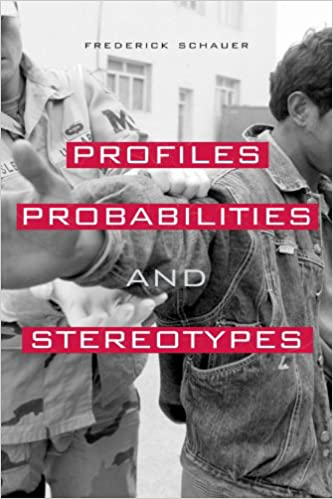
3:16: What difference does it make when statistical discrimination is applied to race, ethnicity, national origin, religion (sometimes), gender, or sexual orientation and what’s at stake in this?
FS: As I argued in Profiles, Probabilities, and Stereotypes (2003), I think it is a mistake to condemn all decision-making by statistical generalization. It is always wrong when there is no empirical basis for the generalization, as with conclusions based on astrological signs. But some statistical generalizations about race and gender, for example, are statistically non-spurious but still wrong, often because the statistical soundness (which is not the same as universally correct) is the product of past discrimination, often because it will be wildly exaggerated by those who apply them, often because it focuses on irrelevant attributes, and often because the demands of equality mandate that people be treated equally for some purposes even if they are not.
3:16: Why don’t you think the question of the admissibility of fMRI deception evidence in court is an exclusively scientific question?
FS: Briefly, because how to use science is not exclusively a scientific question. Science can tell us how reliable a method of lie detection, for example, is, but it cannot tell us how reliable is reliable enough for some purpose. Some degree of reliability may be insufficient to prove someone’s guilt beyond a reasonable doubt, but sufficient for that person to establish that his or her guilt has not been proved beyond a reasonable doubt. And this is not just about lie-detection. To take a current pressing matter, science can tell us about the effectiveness rate of a Covid-19 vaccine, but whether that rate is sufficient for use is a question whose answer must not go against the science, but can be determined only by the application of moral, political, and economic criteria that go beyond the science. How many lives to sacrifice now to get more scientific confidence in the long term (and thus with some number of lives saved in the long term) is a difficult question. Sinclair Lewis grappled with this in Arrowsmith, and the problem, moral to the core, is still with us.
3:16: How do you see the relationship between defeasibility, open-texture and vagueness in law – and are they, or some of them, necessary?
FS: Much of the best philosophical research on vagueness – Diana Raffman and Roy Sorensen come to mind – is highly relevant to law. In Waismann’s original sense, open-texture is an inevitable feature of language, and thus of law. Not every question can be anticipated in advance. Recognizing this, law sometimes desirably uses vagueness to accommodate to an uncertain future, even if it produces great uncertainty now. But using vagueness in this way empowers the interpreters, which is why Bentham was so attracted to judge-disempowering highly specific (non-vague) laws. If we distrust the interpreters or enforcers, we might in some contexts want to disempower them to treat legal rules as defeasible – overridable, or outweighable – even if that disempowerment produces suboptimal results on particular occasions.
3:16:As a take home, could you summarise what you see as the key issues for contemporary legal philosophy and how you might like to see them being tackled?
FS:I would like to see an increasing use of insights from the philosophy of language, philosophy of science, philosophy of mind, and much else being brought to bear on the methods of legal reasoning and legal decision-making, in a way that informs and addresses legal problems. Not concrete immediate legal problems, but problems about how law, in the large, operates. Some philosophers are prone to want put legal problems into philosophical categories, but I would like to see more use of philosophy to enlighten legal understanding on law’s terms.
3:16:And could you recommend five books other than your own for the readers her at 3:16 that would take us further into your philosophical world?
FS:The very fact that you had to add “other than your own” tells us something about people in general and philosophers in particular. And what it tells us is not good.
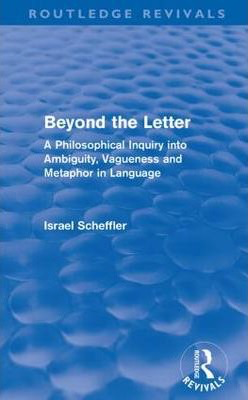
That said, I would suggest Israel Scheffler’s Beyond the Letter;
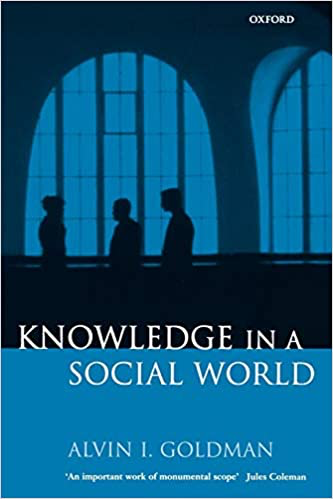
Alvin Goldman’s Knowledge in a Social World,
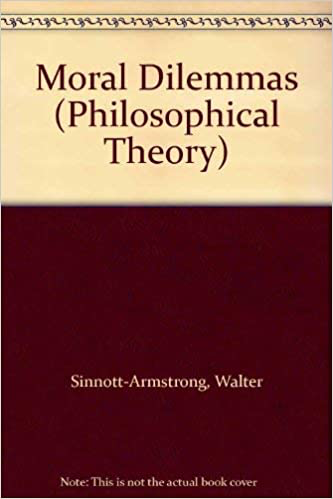
Walter Sinnott-Armstrong’s Moral Dilemmas,
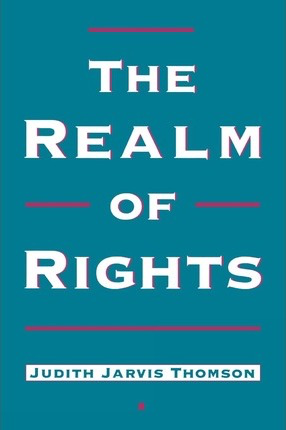
Judith Thomson’s The Realm of Rights,
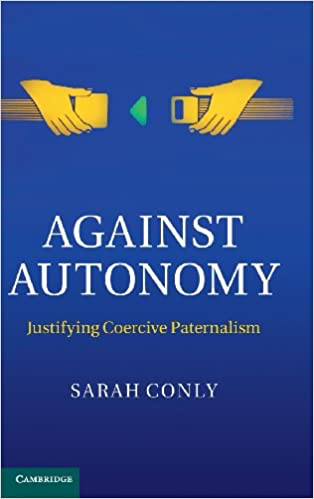
and Sarah Conly Against Autonomy , all books from which I have learned much, even if I often disagree, and all books accessible to those, like me, with philosophical interests but no philosophical training.

ABOUT THE INTERVIEWER
Richard Marshall is biding his time.
Buy his second book here or his first book here to keep him biding!
End Times Series: the index of interviewees
End Time series: the themes
Huw Price's Flickering Shadows series.